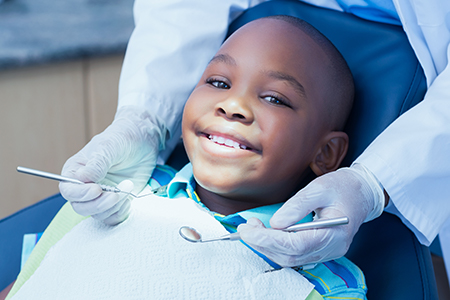
At the office of Smiles Dental at Reston Town Center, the health, comfort, and long-term development of your child’s smile are central to everything we do. Our pediatric dental program is built around prevention, clear communication with parents, and compassionate care that helps young patients feel safe and confident. We focus on establishing solid habits early so children can carry a lifetime of good oral health forward.

Early dental experiences shape how children view oral care for years to come. We encourage families to bring infants and toddlers to the dentist at or near their first birthday so that dental care becomes a normal, non-threatening part of life. A gentle, positive first exam lays the groundwork for routine checkups and empowers parents with practical guidance for daily care.
Our team explains age-appropriate brushing techniques, demonstrates flossing when needed, and discusses strategies to prevent baby bottle decay, thumb-sucking complications, and other common concerns. We focus on coaching and education—helping caregivers set realistic routines and make gradual changes that stick. Small, consistent habits at home pay big dividends in preventing cavities and preserving healthy development.
When treatment is needed, we prioritize minimally invasive approaches and clear explanations so children and parents understand every step. We also reserve time in our schedule to respond to urgent pediatric needs, because timely attention to pain or trauma reduces the chance of more complex problems later. Throughout, our goal is to make each visit constructive, calm, and reassuring.
A pediatric dental exam covers more than just counting teeth. During routine visits we assess the gums, tooth surfaces, jaw growth, bite alignment, and oral function such as swallowing and speech-related patterns. These observations allow us to detect early signs of decay, enamel defects, or growth issues before they become more difficult to manage.
We use modern, low-radiation digital radiographs only when clinically necessary to evaluate areas that aren’t visible to the naked eye and to monitor the development of erupting permanent teeth. These images help our clinicians plan appropriate preventive or restorative care with precision, while keeping radiation exposure to a minimum.
Professional cleanings remove plaque and tartar buildup in places children can miss, and appointments are an opportunity to personalize oral hygiene instructions. Each exam ends with a clear plan for follow-up—whether that’s a continued prevention schedule, targeted treatments, or a referral for specialized care—so families always know what to expect next.

Prevention is the foundation of pediatric dentistry. In-office measures such as fluoride varnish applications and tooth sealants can significantly reduce the risk of decay on vulnerable back teeth. These treatments are quick, painless, and tailored to the child’s age and risk profile, offering added protection while enamel is still maturing.
At-home care is equally important. We provide specific, actionable guidance to parents on effective toothbrushing routines, how to supervise brushing at different ages, and strategies to limit frequent exposure to sugary snacks and drinks. Making water the primary beverage and choosing tooth-friendly snacks can make a measurable difference in cavity risk.
We also help families manage common oral habits like pacifier use and thumb sucking with positive, age-appropriate techniques. When early intervention is needed to protect dental development, we discuss options that support both the child’s comfort and long-term alignment of the teeth and jaws.
Even before a baby’s first tooth emerges, the dental team can advise parents on protecting oral health. Primary teeth typically start appearing around six months of age and are important for chewing, speech development, and holding space for permanent teeth. Establishing care routines early supports comfortable transitions as new teeth come in.
New parents often ask how to clean tiny teeth and soothe teething discomfort. We recommend simple, safe measures such as a soft cloth or an infant toothbrush to clean emerging teeth, and cold teething rings or a chilled spoon (never frozen) to ease tender gums. We’re available to answer questions and provide reassurance whenever concerns arise.
Baby teeth are more vulnerable to decay than many people realize, and untreated cavities can affect nutrition, sleep, and overall well-being. Early checkups allow us to identify risks, offer preventive measures, and guide parents on creating a tooth-friendly environment at home—reducing the likelihood of painful problems later on.

As children grow, dental care evolves to reflect changes in eruption patterns, jaw development, and lifestyle. We monitor facial growth and tooth alignment at each exam so that developing orthodontic concerns are identified early. Early assessment helps determine whether interceptive measures or a later orthodontic referral will produce the best long-term outcomes.
A balanced diet supports both general health and strong teeth. We counsel families about nutrient-rich choices that support enamel development and share practical tips to reduce frequent sugar exposure—such as limiting juice, avoiding prolonged bottle use, and choosing snacks that promote oral health. These small adjustments can lower cavity risk without making mealtimes difficult.
For active kids, protecting the mouth during sports is essential. Custom-fitted mouthguards offer superior fit and comfort compared with generic store-bought options, and they reduce the risk of dental injuries to teeth, lips, and jaw. If your child participates in organized activities, we can recommend the best protective approach for their sport and age.
Some children benefit from more focused treatment—whether for behavioral support, complex restorative needs, or early orthodontic intervention. When necessary, we coordinate care with pediatric specialists to ensure a consistent, comfortable experience. Our team will explain why a referral is recommended and what parents can expect from the next steps.
We also offer guidance for children who experience anxiety about dental visits. A calm, predictable environment, clear explanations, and developmentally appropriate behavior-management techniques are often effective. For children with special health care needs or high anxiety, we discuss tailored options that prioritize safety and dignity.
Good oral health in childhood sets the stage for a lifetime of confident smiles and overall well-being. From first visits and routine prevention to growth monitoring and sports protection, our pediatric dental services are designed to be comprehensive, compassionate, and practical for busy families.
If you’d like to learn more about how we care for children at Smiles Dental at Reston Town Center, please contact us for additional information. We’re happy to answer questions and help you plan the best path forward for your child’s oral health.

A pedodontist is a dentist who has received advanced specialty training in meeting the dental needs of children from infancy to adolescence. Pedodontists, also referred to as "pediatric dentists," study child psychology, behavior management, caring for children with special needs, methods of handling oral/facial trauma, and various techniques for providing anesthesia and sedation. Pedodontists also understand the complexities of facial growth and development and have the clinical skills required to meet the dental needs of all children at every stage of development. Most of all, pedodontists are passionate about what they do and enjoy working with children. They strive to make every dental experience a positive one as they help children establish a strong foundation for good oral health.
Even before your child is born, their first set of teeth is already forming. In fact, by one year of age, some of your baby's front teeth will have already come into place. While the arrival of your baby's first teeth is only one of many developmental milestones, it represents an excellent time to begin a program of oral care. According to recommendations from the American Dental Association, babies should see the dentist around the time of their first birthdays.
Your baby's first teeth typically begin to appear in the 6 to 12-month range. While this is an extraordinary milestone, you need to be aware that your baby may find the experience a little bit uncomfortable. Teething can make babies feel irritable. They may be fussy, have trouble sleeping, not want to eat, and drool quite a bit.
Although you are powerless to speed up the process of teething, there are a few things that you can do to soothe your baby as the new teeth are erupting into place. Common approaches to helping your baby feel more comfortable while getting new teeth, include teething rings or a cold spoon or moist gauze rubbed over their gums.
Even for these few new teeth, it's absolutely essential to establish an effective regimen of oral care. For information on when your baby's first set of teeth will erupt into place, consult this timeline from the American Dental Association: Eruption Charts
Some children persist in sucking their thumbs or fingers beyond their preschool years. For these children, the activity continues to be a source of comfort, relaxation, and security. It may even help them fall asleep at night. However, it's essential to be aware that in the long-term, a finger sucking habit is not healthy.
If your child's thumb or finger sucking habit is still present when the permanent teeth begin to come in, your child is at a higher risk of developing a bad bite. By the age of five or six years, you need to constructively and gently help your child stop the habit.
It's also a good idea to have a comprehensive evaluation at this time. Your pedodontist can assess if there are any habit related alterations to the alignment of your child's teeth or jaws, or if it is affecting their speech or swallowing patterns. They can also discuss habit control strategies with you, as well as follow your child's bite and facial development as they grow. If interceptive appliances or corrective orthodontic care are recommended, the timetable and best options in care will be explained in complete detail.
We recommend a child's first dental visit at or near their first birthday so that dental care becomes familiar and nonthreatening. This early visit lets the clinician check oral development, screen for early decay, and address feeding or hygiene concerns. It also gives parents practical guidance on brushing, pacifier use, and establishing daily routines for oral health.
At Smiles Dental at Reston Town Center we use short, gentle first exams to build trust and answer questions about teething, nutrition, and oral habits. Parents are encouraged to attend and help make the appointment positive for the child. Follow-up visits are scheduled based on each child's needs and risk profile to maintain preventive care.
Pediatric dental visits focus on predictability, clear explanations, and calm interactions to reduce fear and build confidence. Clinicians use age-appropriate language, demonstrate tools on a toy or a parent's finger, and proceed at a pace the child can tolerate to avoid overwhelming them. Positive reinforcement and allowing a caregiver to be present often helps the child feel secure throughout the visit.
For children with higher anxiety, the team discusses behavior-management strategies and creates a stepwise plan to gradually increase cooperation. Short, focused appointments and consistent routines help many children adjust to dental care. When specialized support is needed, the practice will recommend appropriate options and coordinate care with specialists.
A pediatric dental exam evaluates more than just the number of teeth; clinicians assess gums, tooth surfaces, jaw growth, bite alignment, and oral function such as swallowing and speech-related patterns. The provider looks for early signs of decay, enamel defects, or eruption problems that may affect long-term development. Each exam includes a review of the child’s medical and dental history to tailor preventive and treatment recommendations.
Professional cleanings remove plaque and tartar that children often miss at home and appointments are an opportunity to personalize home care instructions. The visit concludes with a clear plan for follow-up, whether that is routine prevention, targeted treatments, or a referral for specialized care. Families receive practical tips to reinforce habits that support oral health between visits.
Modern pediatric dentistry uses low-dose digital radiographs only when clinically necessary to evaluate areas not visible to the naked eye and to monitor growth and tooth eruption. Clinicians follow the principle of keeping radiation exposure as low as reasonably achievable and use protective measures such as appropriate shielding and limiting the frequency of images. The decision to take x-rays is based on the child's age, symptoms, and individual risk for decay.
The diagnostic benefits of targeted radiographs often outweigh the minimal risks because early detection can prevent more extensive problems later. Parents are informed about the reasons for imaging and how it helps guide precise preventive or restorative care. If you have concerns, the dental team will explain alternatives and the rationale for any recommended images.
Preventing cavities in primary teeth starts with consistent daily habits: brushing twice a day with an appropriate amount of fluoridated toothpaste, supervising until the child can reliably handle brushing, and introducing flossing when teeth contact each other. Limiting frequent exposure to sugary snacks and drinks, making water the primary beverage, and avoiding prolonged bottle or sippy cup use at bedtime reduce cavity risk. Regular dental visits allow early identification of risk factors and timely preventive measures.
Fluoride varnish applications in the office and dietary guidance from the dental team provide additional protection when needed. Establishing a predictable oral care routine and creating a tooth-friendly environment at home make a measurable difference over time. Caregivers who have specific concerns about feeding, medication sugars, or oral habits should discuss tailored strategies with the dentist.
Fluoride varnish is often recommended for infants and children at risk for decay because it is a quick, safe, and effective way to strengthen enamel and help prevent cavities. The dental team assesses each child's risk profile and applies varnish at routine visits when indicated to support enamel maturation. Parents receive instructions on home care following an application to maximize its benefit.
Dental sealants are typically recommended for the chewing surfaces of permanent molars and premolars once they erupt, because deep grooves on these teeth are vulnerable to decay. Sealants are applied to protect the teeth while enamel is still maturing and are especially useful for children who have difficulty thoroughly cleaning back teeth. Your child's provider will determine the best timing and discuss monitoring and maintenance of sealants.
For emerging teeth, a soft cloth or an infant toothbrush used gently after feedings helps remove plaque and residue and establishes a routine early on. Caregivers should avoid putting a baby to bed with a bottle containing anything other than water and seek guidance on appropriate use of sippy cups to reduce prolonged sugar exposure. Routine checkups starting near the first birthday let the dental team provide hands-on demonstrations and practical tips tailored to the infant's needs.
Teething discomfort is commonly eased with firm gum massage, chilled (not frozen) teething rings, or a cold spoon applied briefly to the gums. Over-the-counter medications or topical products should be used only under a pediatrician's guidance. If teething symptoms are severe, prolonged, or accompanied by other concerning signs, contact the dental office or your child's physician for advice.
Children benefit from early monitoring of jaw growth and tooth alignment so that developing orthodontic concerns are identified when intervention is most effective. An initial assessment is often recommended around age 7 because that is a common stage at which permanent teeth begin to erupt and certain problems—such as crossbites, severe crowding, or abnormal eruption patterns—become apparent. Early evaluation does not always mean immediate treatment, but it allows the team to plan timing and options.
If interceptive measures are appropriate, the dentist will explain what to expect and how those steps may simplify or shorten later orthodontic care. In many cases, coordination with an orthodontist provides the best long-term outcome for tooth alignment and jaw development. Families receive ongoing monitoring and clear recommendations based on each child's growth and dental maturity.
Mouthguards are an important preventive tool for children who participate in contact or high-impact sports because they reduce the risk of dental injuries to teeth, lips, and the jaw. Custom-fitted mouthguards made by the dental office provide a better fit, improved comfort, and more reliable protection than generic store-bought options. Properly fitted protection also helps minimize distraction and anxiety about potential injuries during play.
The dental team can recommend the best type of mouthguard for the child’s sport and age, take impressions if a custom guard is chosen, and provide care instructions for cleaning and storage. It is important to replace or adjust mouthguards as a child grows to maintain effective protection. Coaches and parents should be encouraged to make mouthguard use a routine part of sports safety planning.
A referral to a pediatric dental specialist may be recommended for complex restorative needs, behavior management challenges that require specialized techniques, or medical conditions that affect oral care. Specialists are trained to manage advanced treatment needs, dental trauma, or patients with special health care requirements, and a referral ensures the child receives care in an appropriate setting. The general dentist will explain the clinical reasons for a referral and what to expect from the specialist.
The team at Smiles Dental at Reston Town Center coordinates referrals, provides clear explanations, and helps families prepare for next steps so the transition is smooth and well understood. Communication between providers and caregivers focuses on continuity of care and the child's comfort throughout treatment. Parents are encouraged to ask questions about the specialist's approach and any preparatory measures recommended before the appointment.

Ready to schedule your next dental appointment or have questions about our services?
Contacting Smiles Dental at Reston Town Center is easy! Our friendly staff is available to assist you with scheduling appointments, answering inquiries about treatment options, and addressing any concerns you may have. Whether you prefer to give us a call, send us an email, or fill out our convenient online contact form, we're here to help. Don't wait to take the first step towards achieving the smile of your dreams – reach out to us today and discover the difference personalized dental care can make.